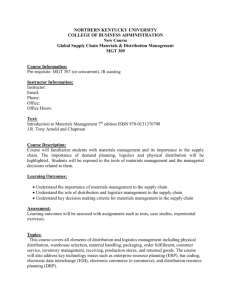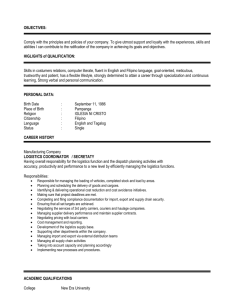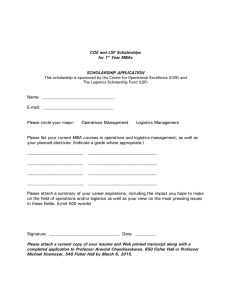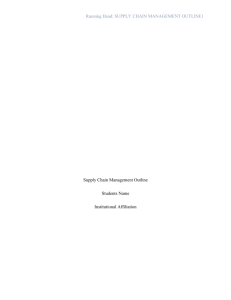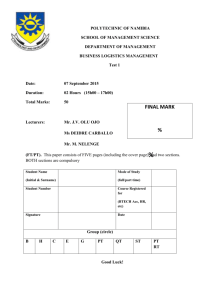FISHER COLLEGE OF BUSINESS DEPARTMENT OF MARKETING AND LOGISTICS COURSE SYLLABUS
advertisement
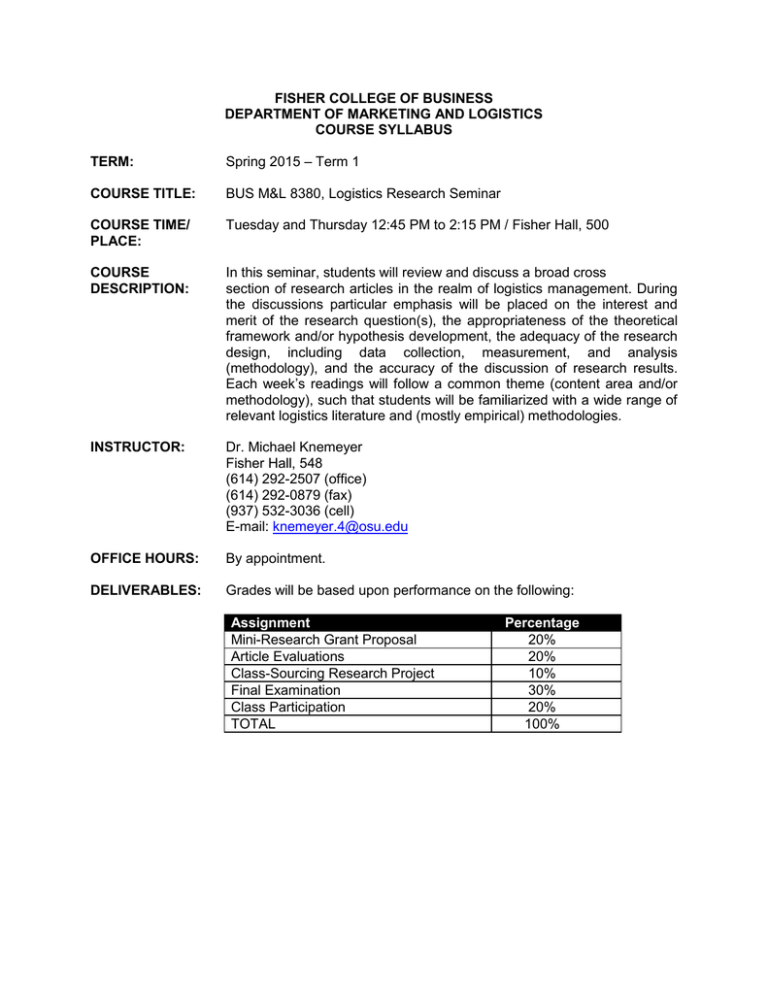
FISHER COLLEGE OF BUSINESS DEPARTMENT OF MARKETING AND LOGISTICS COURSE SYLLABUS TERM: Spring 2015 – Term 1 COURSE TITLE: BUS M&L 8380, Logistics Research Seminar COURSE TIME/ PLACE: Tuesday and Thursday 12:45 PM to 2:15 PM / Fisher Hall, 500 COURSE DESCRIPTION: In this seminar, students will review and discuss a broad cross section of research articles in the realm of logistics management. During the discussions particular emphasis will be placed on the interest and merit of the research question(s), the appropriateness of the theoretical framework and/or hypothesis development, the adequacy of the research design, including data collection, measurement, and analysis (methodology), and the accuracy of the discussion of research results. Each week’s readings will follow a common theme (content area and/or methodology), such that students will be familiarized with a wide range of relevant logistics literature and (mostly empirical) methodologies. INSTRUCTOR: Dr. Michael Knemeyer Fisher Hall, 548 (614) 292-2507 (office) (614) 292-0879 (fax) (937) 532-3036 (cell) E-mail: knemeyer.4@osu.edu OFFICE HOURS: By appointment. DELIVERABLES: Grades will be based upon performance on the following: Assignment Mini-Research Grant Proposal Article Evaluations Class-Sourcing Research Project Final Examination Class Participation TOTAL Percentage 20% 20% 10% 30% 20% 100% Mini-Research Grant Proposal Each student will develop a mini-research grant proposal that is focused on gaining support to conduct a study on a topic of his or her choice within the domain of logistics management. This proposal should introduce a relevant research question, review the relevant literature related to the question, propose a research framework and establish hypotheses to be tested. An appropriate research methodology/approach for conducting the research should also be detailed. Provide a budget and timeline for conducting the research. The goal of the miniresearch grant proposal is to convince me of the value of your idea and provide a starting point for further developing, conducting and eventually publishing the proposed research project. These proposals should be no longer than 15 pages. Article Evaluations Each student will be responsible for writing up an evaluation each week for an assigned article. These evaluations should be no more than four pages long, double-spaced. Please follow the format below, using headings, in writing your evaluations. The evaluation should: 1. Provide the title, author(s) and citation for the article. 2. Provide a brief synopsis of the major points of the article (approximately ¾ of a page.) Review what the article covered and highlight key findings. What is the motivation for the article? Provide some details on the study results and key findings. 3. List the contributions of the article (approximately ½ of a page.) How does the paper contribute to an enhanced understanding of the topic? How does it fit into existing research? 4. Assess how well the article address the established topic (research design). Critique the methodology or approach used in the article for studying the particular research question (1 or 2 pages.) Are the points well grounded in theory? In practice? Are there holes in the logic or presentation? Omissions? 5. Indicate the managerial implications of the research (approximately ¼ of a page.) 6. Suggest directions for future research (approximately ½ of a page.) What additional work is needed on the subject? What associated topics could be researched? Please frame these as potential research questions. Evaluations are due 2 hours prior to the beginning of class. These evaluations should be submitted to the appropriate CARMEN Dropbox with hard copies brought to class for all participants including me. Class Sourcing Research Project In an effort to try something new in the seminar, we will conduct what I am terming a class sourcing research project. The idea is grounded in the crowd sourcing projects that have emerged over the past few years. The project will involve the class (including me) selecting a general research topic area during our first session. A discussion board will then be set up in Carmen to serve as a repository for ideas, thoughts, literature, rough drafts, etc. relating to the research project. At the end of the term I will evaluate each student’s contribution to this project. Contributions can come in many forms and my evaluation will not only focus on the quantity of contributions. The value of the contribution to moving the idea forward will also serve as a primary criterion for evaluation. At the end of the term, we will determine as a class the next steps for the project and establish interest/desire of each person to be involved in further refinement of the project. Any resulting paper/presentation will acknowledge the contributions of the class members. Final Examination A final exam will be given at the end of the course. The final exam will serve as preparation for the logistics major written exam. Class Participation Participation will be based on a combination of factors to include: attendance, preparation for class, frequency of participation, quality of participation, organization, and conciseness. Participation will primarily focus on student presentations of their assigned articles as well as interaction with other students who are presenting their articles. Class Schedule Note: I may revise this schedule to accommodate more in-depth focus or discussion where warranted, or to take advantage of guests if the opportunity should arise. We will attempt to stay as close to this schedule as possible. Date January February Topic 13: Session 1: Overview and Expectations 15: Session 2: Logistics vs Supply Chain Management 20: Session 3: Logistics Customer Service 22: Session 4: Transportation 27: Session 5: Procurement 29: Session 6: Inventory Management 3: Session 7: Information Technology in Logistics 5: Session 8: Warehousing 10: Session 9: Sustainability and Reverse Logistics 12: Session 10: Humanitarian Logistics 17: Session 11: Logistics Outsourcing and Inter-organizational Relationships 19: Session 12: Logistics Strategy 24: Session 13: The Publication Process 26: Session 14: Final Exam

